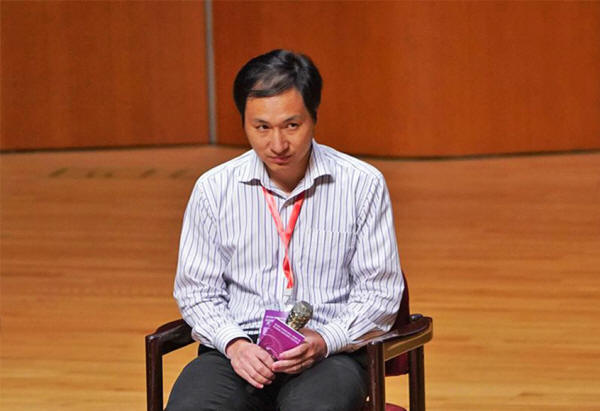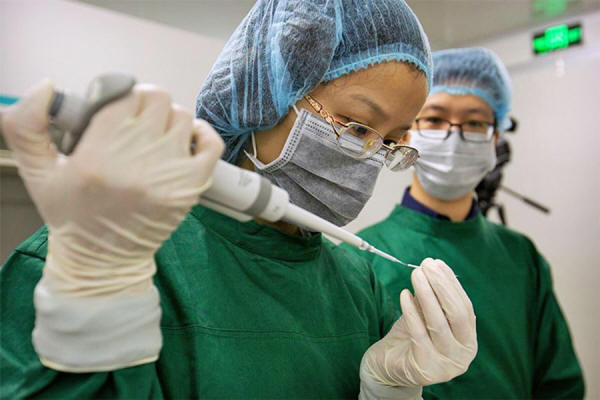1. Is He Jiankui
in trouble?
On 27 November, a day before He gave his talk at the summit,
China's national health ministry called on the government of
Guangdong - where He's university, the Southern University of
Science and Technology is - to investigate He.
Two days later, the
science ministry ordered him to stop doing any science; He had
already said the experiments were on hold.
How the Guangdong
investigation will proceed is not clear. He is accused of
transgressing a 2003 health-ministry guideline, which is not a
law and has no clear penalties attached to it.
Whether He's university will take any action against him is also
unclear.
A university
spokesperson told Nature that he,
"cannot disclose such
information at this moment" and to wait for official statements
"at an appropriate time."
He has been on leave
since February 2018 and this is scheduled to last until January
2021; this week, the university criticized his claims and
distanced itself from his work.
On 27 November, the laboratory web page hosted by the university
- to which He has been referring people for information about
the gene-edited babies - went down, although
another site for He's lab
remains.
Several statements
praising He Jiankui's accomplishments have also disappeared from
government sites.
A post on the science
ministry's site describing a genomic-sequencing technology that
He developed, and a post praising He's genomic sequencing
technology on the website of the Thousand Talents Plan - a
prestigious scheme to bring
leading academics back to China - are both now inaccessible.
It's not clear if
these actions are related to the week's events, but both posts
were still accessible until recently.
He went back to Shenzhen, where he lives, after his talk at the
summit, according to a statement provided by He's spokesperson,
Ryan Ferrell, and missed a planned appearance at the
summit on 29 November.
"I have returned
to Shenzhen and will not attend the conference on Thursday.
I will remain in China, my home country, and cooperate fully
with all inquiries about my work," the statement said.
2. Are He's claims
accurate?
Many scientists have said that an independent body should
confirm He's scientific claims by performing an in-depth
comparison of the parents' and children's genes.
The problem is,
almost everyone agrees that the babies and their parents should
remain anonymous.
"He has kept them
secret, and for good reasons," says Nobel-prizewinning
biologist David Baltimore, chair of the summit's organizing
committee and former president of the California Institute
of Technology in Pasadena.
"We haven't even
laid out how that independent investigation will happen."
He's team could
supply anonymized samples.
Outside scientists
could also visit He's laboratory to analyze the data.
In a
statement released by his spokesperson, He said that he will
invite other researchers to do an independent investigation.
"My raw data will
be made available for third-party review."
He also says that he
has submitted studies on his human gene-editing research to
journals for publication.
He has told some
scientists that a paper will be published by the end of the
year, but has not specified in which journal.
But even if this
happens, strict Chinese genetic-resources laws would prevent He
from publishing the gene sequences of the parents or the
children, and without those, scientists would have a difficult
time verifying his claims.
3. How exactly did
CRISPR edit the twins' genomes?
In the absence of a peer-reviewed publication or preprint
describing He's gene-editing work, some scientists are parsing
his presentation to try and understand how the twins' genomes
were edited - and any potential consequences of these changes.
Gaetan Burgio, a geneticist at Australia National
University in Canberra who works on CRISPR gene editing, says
that the raw sequencing data that He presented in his talk
suggests that the babies' cells harbor multiple edited versions
of the CCR5 gene, with different-sized DNA deletions.
Such 'mosaicism' can
be caused when CRISPR edits some early embryo cells differently
to others, or fails to edit some. Other researchers have
reported mosaicism in efforts to edit human embryos for research
purposes.
RNA researcher Sean Ryder, at the University of Massachusetts
Medical School in Worcester, pointed out additional concerns in
a Twitter post.
He Jiankui told the gene-editing conference that he targeted the
CCR5 gene because some people naturally carry a mutation in CCR5
- a 32-DNA-letter deletion known as delta-32 - that inactivates
the gene.
But Ryder says that
that the CCR5 deletions that He claimed to introduce into the
babies' cells by CRISPR gene editing are not identical to the
delta-32 mutation.
"The point is
that none of the three match the well-studied delta 32
mutation, and as far as I can tell, none have been studied
in animal models. Unconscionable," Ryder wrote in the post.
He Jiankui, seated,
looks up as he answers questions during his presentation at the
human genome editing summit on 28th November

He
Jiankui claims
to
have helped produce
the
first babies born
with edited genomes.
Credit: TPG via Zuma
4. When will there
be another gene-edited human?
As Jennifer Doudna, a pioneer of the CRISPR-Cas9
genome-editing tool, listened to He present his work at the
summit, one idea kept coming back to her.
"The thought I
kept having was the potential for rogue scientists to use
this in unethical ways. It's a real risk," says Doudna, a
biochemist at the University of California, Berkeley.
Before He's
revelations, many scientists were already worried about the
prospect that someone was on the brink of creating a gene-edited
person.
Biologist George
Daley, dean of Harvard Medical School in Boston,
Massachusetts, and a member of the summit's organizing
committee, pointed to a procedure that replaces diseased
mitochondrial DNA in an embryo with healthy mitochondrial DNA
from another person, eliminating the embryo's original
disease-causing mutation.
Although
mitochondrial-replacement therapy lacks the approval of the
biomedical community or the US Food and Drug Administration
(FDA), doctors based in New York City used it to
produce a baby in Mexico in
2016.
"Similar
premature practice of embryo editing by CRISPR-Cas9 is
likely despite our calls for caution," Daley said.
At the Hong Kong
summit, scientists discussed whether another announcement of
human-germline editing - the modification of genes passed on to
future generations - is nigh.
"We do have
reason to be concerned," said Baltimore. "If anyone working
in the field gets indications that it is happening, it is
important they let authorities know."
5. Will He's
revelations hamper ethical efforts to do germline editing?
Many researchers fear that He's revelations could hamper the
future of
germline editing.
"In the US some
are suggesting draconian bans, which is antithetical to
goals of science," says Baltimore.
In the wake of the
revelations, FDA Commissioner Scott Gottlieb made comments that
raised concerns among scientists.
"Governments will
now have to react," he told the
news site BioCentury.
And on 28 November,
the US National Institutes of Health (NIH) director
Francis Collins said in a statement that,
"the need for
development of binding international consensus on setting
limits for this kind of research, now being debated in Hong
Kong, has never been more apparent."
The statement
released at the summit's close makes a plea to keep open a path
for safely translating gene-editing technology into treatments:
"Germline genome
editing could become acceptable in the future if these risks
are addressed."
But the debacle has
focused worldwide interest on germline genome editing and fears
of a chilling effect may be overstated.
"There might be
some women excited by the possibility of taking part in this
research," said Judith Daar, at the University of California
Irvine School of Medicine and School of Law, at a summit
satellite session when asked whether the controversy might
dissuade women from donating eggs for research in the
future.
"The instinct is
to say this is a debacle and could suppress participation.
But I'm always amazed by the diverse reactions," she added.
6. How will
scientists ensure better oversight of germline editing in
future?
"We don't have a
blueprint, but we have been asking academies," said
Baltimore. "It is a challenge to the world."
The statement
released by the summit's organizing committee suggests that
science academies around the world make recommendations to their
own governments, while coordinating with each other.
It also suggests the creation of an international forum that
would funnel research and clinical trials through an
international registry, and discuss issues such as equitable
access to the benefits of gene editing.
But genome editing in
human embryos potentially has an unwieldy range of users, and
that could make maintaining such an organization difficult.
"Virtually every
lab doing molecular biology is using this technique," said
Daley.



